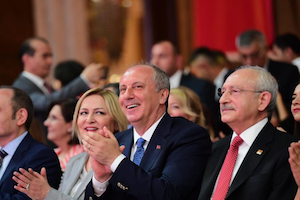Will the Kurdish Question Secure Erdoğan's Re-election?
By Halil Karaveli
June 18, 2018
The Kurdish question may serve President Recep Tayyip Erdoğan, helping to secure his re-election. The election campaign has demonstrated that Erdoğan no longer energizes the masses; after fifteen years in power, the Turkish president shows every sign of being worn out. He is no longer an inspirational leader; he has nothing new to say or to promise. But Erdoğan nonetheless retains the loyalty of the AKP base. And as the spokesperson of the nationalism of the Turkish state he is assured of enough non-partisan support as well.

Belge: Erdoğan the new hero of Kemalists?
Murat Belge in Birikim writes that the reigning mentality in Turkey is that tension is the best ally of rulers. Tayyip Erdoğan saw that declaring war on the Kurds would give him back what he had lost, and he made those who called for stern measures against the Kurds happy. Tayyip Erdoğan had also decided to make peace with the neo-nationalists with whom he had been jarring until recently. After the parting of ways with the Gülenists, there is a potential to make peace with the Kemalists, or at least with some of them. When the Kurds are struck, some of the nationalists who hate the AKP can’t help but to be happy about it and they start thinking that the AKP may have some “positive” sides. Can these circles forget, let alone pardon, all those “Sledgehammers” and “Ergenekons?” I don’t think so. But this is the world of politics. It may be necessary to store away some problems for a while; and then, when you have become sufficiently strong, you think that you will extract them again. For the time being, this is the prevailing mood among those circles. So, can we thus conclude that Tayyip Erdoğan has gotten his “rose garden without thorns?” Well, history has never seen any such “rose garden.” What a look at the facts tells us is that these policies of tension and quarrel that Tayyip Erdoğan has made so much use of have confined him to a terrain that is becoming increasingly narrow.
Yılmaz: the Kurds are questioning but not abandoning PKK
Arzu Yılmaz in Birikim writes that the value of the PKK for the Kurdish people is above all that it is a defense force. The Kurds, who felt hopeless in the face of the cruelty they endured for years, managed to acquire relative defensive capability with the PKK. However, especially what has happened during the last six months has depreciated the value of the PKK as a defense force. There is no ground for presenting the fact that resistance in Sur or in Cizre has continued until today as a success story. What is clearly obvious is that the Kurds are without defense and stand alone in the face of the violence to which they are subjected. What is especially difficult for the Kurds is that they once again find themselves in the position of “victims.” Yet only a year ago, “self-confidence” prevailed among everyone on the streets of Kurdistan. The claim “the Kurds are no longer the old Kurds” above all expressed the conviction that the days of “victimhood” lay behind the Kurds. But that was not true… everyone to whom you speak ask the PKK, “Why did you enter a war that you could not win?” But even if the Kurds criticize the PKK, they are not engaged in any attempt to exclude the PKK. This must above all be realized by the government that is trying to invent new interlocutors in Kurdistan. For the Kurds, the PKK is still, with all its faults, something that belongs to “us.”
Bayramoğlu: Turkey should reconsider its approach to the Kurds
Ali Bayramoğlu in Yeni Şafak writes that the geopolitical winds are behind PKK-PYD and against Turkey. Turkey does not have any card up its sleeve that it can deploy to stop the Kurdish region in Syria that it sees as an existential threat. As long as this balance persists across the border, it is not reasonable to expect that Kandil (the headquarters of PKK in northern Iraq) is going to abandon its attempts to establish areas of sovereignty, its strategy of creating cantons, by means of urban warfare and the politics of ditches. The statements of the authorities promising that “soon the cleaning will be finished, and public order will be established,” appear naïve considering past events and the present balances of power. This is so even though a significant part of the population in the region does not approve of the actions of the PKK. This does not mean that they have edged closer to the approach of the state and its position. Isn’t it time that Turkey revises its reading of the region, its view of the Kurdish movements, the Kurdish question and its roadmap for the future?


